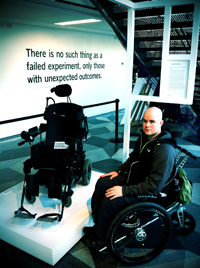Interviews

Name: Mark Pollock
Degree/Masters: B.A. (1998)
Why did you chose Christopher Reeve's wheelchair to feature as part of Science Gallery's Fail Better Exhibition, which runs until 24 April.
FAIL BETTER is a perspective-shifting exploration of epic and inspirational failures and features contributions from all walks of life, including famous explorers, inventors, scientists, and athletes. Our contribution was to bring Christopher Reeve's wheelchair to Ireland to highlight the failed notion of rehabilitation; that the wheelchair compensates for our inability to walk. And what I mean by that is that the success in transportation by the wheelchair is not so good that it compensates for walking. So, I suppose the wheelchair wins the transport challenge but does nothing to further our pursuit of a cure. Therefore, for me it represents a failed notion of rehabilitation. From hospital beds to wheelchairs isn't enough, it is time to go further and try to get out of them I think.
How important is the relationship between science and medicine for finding a cure for spinal cord injury?
After my fall in 2010 friends of mine set up a fundraising campaign and set up Mark Pollock Trust. Once the initial impact of my spinal injury was dealt with and I got out of hospital after 18 months, we started to consider how I might best contribute to the wider community of people with spinal injuries. Through my own personal exploration of rehab options out there I began to meet people focused on different parts of the search for a cure. Some were looking at exercise physiology, some were looking at robotics and others were looking at scientific research of the nervous system and cell biology. As I carried on along my own learning journey it became clear that the scientists, technologists and physiologists often do not interact with each other. So, we have designed Mark Pollock Trust to focus on this collaboration gap by setting our mission to find and connect people worldwide to fast-track a cure for spinal injuries.
What is the most useful piece of advice you've ever received?
He who has a why to live can bear with almost any how - Friedrich Nietzsche
This credo reminds me to look forward and to fill my life with great things. That way the past stays in the past and the bad things don't have breathing room. When I went blind at 22, I read this quote in Viktor Frankl's book, Man's Search for Meaning and it stayed with me. On the 10th anniversary of going blind this philosophy led me to race to the South Pole. I broke my back in 2010. Now I am living with paralysis I continually ask myself 'why?' Not 'why me?' but - why am I doing what I'm doing? And I know why - I am on a mission to find and connect people worldwide to fast-track a cure for spinal injuries. Racing to the South Pole blind and finding a cure for paralysis risks failure. But I think that is the 'why' Nietzsche was talking about - understanding the vision to pursue success rather than focusing on the hardship or risk of failure.
What are your Top 3 Desert Island discs?
The Smiths by The Smiths
Fool's Gold by The Stone Roses
Parklife by Blur
Who would you invite to your dream dinner party?
My fiancée Simone George because she is great fun, intelligent and loves a party. Cameron Diaz because she is funny and I remember her in The Mask when I could still see. Richard Branson because he is an adventurer an entrepreneur. Commander Chris Hatfield because he seems funny, can play the guitar (for the sing song) and has commanded the international space station. Sir Ernest Shackleton because he was probably one of the greatest leaders of all time and a true Polar pioneer.

